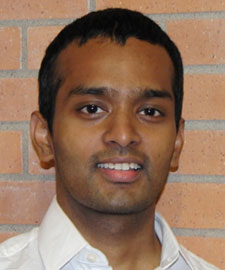 An MIT graduate has won the 2012 Doctoral Dissertation Award presented by the Association for Computing Machinery (ACM) for his work designing wireless systems that can successfully reconstruct transmitted information after being affected by interference. Currently an assistant professor at the University of Washington, Shyamnath Gollakota completed his dissertation, “Embracing Interference in Wireless Systems” at MIT, who nominated him for the award.
An MIT graduate has won the 2012 Doctoral Dissertation Award presented by the Association for Computing Machinery (ACM) for his work designing wireless systems that can successfully reconstruct transmitted information after being affected by interference. Currently an assistant professor at the University of Washington, Shyamnath Gollakota completed his dissertation, “Embracing Interference in Wireless Systems” at MIT, who nominated him for the award.
“Wireless networks have been designed with the assumption that interference is intrinsically harmful and must be avoided,” Gollakota wrote in his dissertation. “[However,] instead of viewing interference as an inherently counterproductive phenomenon that should be avoided, we design practical systems that transform interference into a harmless, and even beneficial, phenomenon.”
In his dissertation, Gollakota discusses ZigZag, the first Wi-Fi receiver to “successfully reconstruct the transmitted information in the presence of packet collisions” and TIMO, a Wi-Fi receiver that “can decode in the presence of high-power cross-technology interference from other devices such as baby monitors, cordless phones and microwave ovens.” Gollakota also covers methods to improve security with interference, using wireless medical implants as an example.
Gollakota will receive the Doctoral Dissertation Award at the annual ACM Awards Banquet on June 15 in San Francisco, Calif.
Readers: Do you agree with Doctoral Dissertation Award winner Shyamnath Gollakota’s dissertation on “Embracing Interference in Wireless Systems”?





